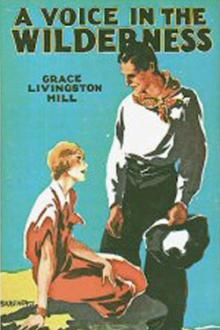A Voice in the Wilderness by Grace Livingston Hill (best short books to read .TXT) 📕

- Author: Grace Livingston Hill
- Performer: -
Book online «A Voice in the Wilderness by Grace Livingston Hill (best short books to read .TXT) 📕». Author Grace Livingston Hill
She wrote her note carefully:
Dear Margaret [she had heard Hazel call Margaret by her first name, and rightly judged that their new friendship was already strong enough to justify this intimacy],—I have found just the opportunity I wanted for you to come to us. These Indians are thoroughly trustworthy and are coming in just the direction to bring you to a point where we will meet you. We have decided to go on to Walpi at once, and will probably meet you near Keams, or a little farther on. The Indian knows the way, and you need not be afraid. I trust him perfectly. Start at once, please, so that you will meet us in time. John has to go on as fast as possible. I know you will enjoy the trip, and am so glad you are coming.
Lovingly,
Hazel Radcliffe Brownleigh.
Rosa read it over, comparing it carefully with the little yellow note from her Testament, and decided that it was a very good imitation. She could almost hear Mrs. Brownleigh saying what she had written. Rosa really was quite clever. She had done it well.
She hastily sealed and addressed her letter, and then hurried down to talk with the Indians again.
The place she had ordered for them to rest was at some distance from the kitchen door, a sort of outshed for the shelter of certain implements used about the ranch. A long bench ran in front of it, and a big tree made a goodly shade. The Indians had found their temporary camp quite inviting.
Rosa made a detour of the shed, satisfied herself that no one was within hearing, and then sat down on the bench, ostensibly playing with the papoose, dangling a red ball on a ribbon before his dazzled, bead-like eyes and bringing forth a gurgle of delight from the dusky little mummy. While she played she talked idly with the Indians. Had they money enough for their journey? Would they like to earn some? Would they act as guide to a lady who wanted to go to Walpi? At least she wanted to go as far as Keams, where she might meet friends, missionaries, who were going on with her to Walpi to visit the Indians. If they didn't meet her she wanted to be guided all the way to Walpi? Would they undertake it? It would pay them well. They would get money enough for their journey and have some left when they got to the reservation. And Rosa displayed two gold pieces temptingly in her small palms.
The Indian uttered a guttural sort of gasp at sight of so much money, and sat upright. He gasped again, indicating by a solemn nod that he was agreeable to the task before him, and the girl went gaily on with her instructions:
"You will have to take some things along to make the lady comfortable. I will see that those are got ready. Then you can have the things for your own when you leave the lady at Walpi. You will have to take a letter to the lady and tell her you are going this afternoon, and she must be ready to start at once or she will not meet the missionary. Tell her you can only wait until three o'clock to start. You will find the lady at the school-house at noon. You must not come till noon—" Rosa pointed to the sun and then straight overhead. The Indian watched her keenly and nodded.
"You must ask for Miss Earle and give her this letter. She is the school-teacher."
The Indian grunted and looked at the white missive in Rosa's hand, noting once more the gleam of the gold pieces.
"You must wait till the teacher goes to her boarding-house and packs her things and eats her dinner. If anybody asks where you came from you must say the missionary's wife from Ganado sent you. Don't tell anybody anything else. Do you understand? More money if you don't say anything?" Rosa clinked the gold pieces softly.
The strange, sphinx-like gaze of the Indian narrowed comprehensively. He understood. His native cunning was being bought for this girl's own purposes. He looked greedily at the money. Rosa had put her hand in her pocket and brought out yet another gold piece.
"See! I give you this one now"—she laid one gold piece in the Indian's hand—"and these two I put in an envelope and pack with some provisions and blankets on another horse. I will leave the horse tied to a tree up where the big trail crosses this big trail out that way. You know?"
Rosa pointed in the direction she meant, and the Indian looked and grunted, his eyes returning to the two gold pieces in her hand. It was a great deal of money for the little lady to give. Was she trying to cheat him? He looked down at the gold he already held. It was good money. He was sure of that. He looked at her keenly.
"I shall be watching and I shall know whether you have the lady or not," went on the girl, sharply. "If you do not bring the lady with you there will be no money and no provisions waiting for you. But if you bring the lady you can untie the horse and take him with you. You will need the horse to carry the things. When you get to Walpi you can set him free. He is branded and he will likely come back. We shall find him. See, I will put the gold pieces in this tin can."
She picked up a sardine-tin that lay at her feet, slipped the gold pieces in an envelope from her pocket, stuffed it in the tin, bent down the cover, and held it up.
"This can will be packed on the top of the other provisions, and you can open it and take the money out when you untie the horse. Then hurry on as fast as you can and get as far along the trail as possible to-night before you camp. Do you understand?"
The Indian nodded once more, and Rosa felt that she had a confederate worthy of her need.
She stayed a few minutes more, going carefully over her directions, telling the Indian to be sure his squaw was kind to the lady, and that on no account he should let the lady get uneasy or have cause to complain of her treatment, or trouble would surely come to him. At last she felt sure she had made him understand, and she hurried away to slip into her pretty white dress and rose-colored ribbons and ride to school. Before she left her room she glanced out of the window at the Indians, and saw them sitting motionless, like a group of bronze. Once the Indian stirred and, putting his hand in his bosom, drew forth the white letter she had given him, gazed at it a moment, and hid it in his breast again. She nodded her satisfaction as she turned from the window. The next thing was to get to school and play her own part in the Commencement exercises.
The morning was bright, and the school-house was already filled to overflowing when Rosa arrived. Her coming, as always, made a little stir among admiring groups, for even those who feared her admired her from afar. She fluttered into the school-house and up the aisle with the air of a princess who knew she had been waited for and was condescending to come at all.
Rosa was in everything—the drills, the march, the choruses, and the crowning oration. She went through it all with the perfection of a bright mind and an adaptable nature. One would never have dreamed, to look at her pretty dimpling face and her sparkling eyes, what diabolical things were moving in her mind, nor how those eyes, lynx-soft with lurking sweetness and treachery, were watching all the time furtively for the appearance of the old Indian.
At last she saw him, standing in a group just outside the window near the platform, his tall form and stern countenance marking him among the crowd of familiar faces. She was receiving her diploma from the hand of Margaret when she caught his eye, and her hand trembled just a quiver as she took the dainty roll tied with blue and white ribbons. That he recognized her she was sure; that he knew she did not wish him to make known his connection with her she felt equally convinced he understood. His eye had that comprehending look of withdrawal. She did not look up directly at him again. Her eyes were daintily downward. Nevertheless, she missed not a turn of his head, not a glance from that stern eye, and she knew the moment when he stood at the front door of the school-house with the letter in his hand, stolid and indifferent, yet a great force to be reckoned with.
Some one looked at the letter, pointed to Margaret, called her, and she came. Rosa was not far away all the time, talking with Jed; her eyes downcast, her cheeks dimpling, missing nothing that could be heard or seen.
Margaret read the letter. Rosa watched her, knew every curve of every letter and syllable as she read, held her breath, and watched Margaret's expression. Did she suspect? No. A look of intense relief and pleasure had come into her eyes. She was glad to have found a way to go. She turned to Mrs. Tanner.
"What do you think of this, Mrs. Tanner? I'm to go with Mrs. Brownleigh on a trip to Walpi. Isn't that delicious? I'm to start at once. Do you suppose I could have a bite to eat? I won't need much. I'm too tired to eat and too anxious to be off. If you give me a cup of tea and a sandwich I'll be all right. I've got things about ready to go, for Mrs. Brownleigh told me she would send some one for me."
"H'm!" said Mrs. Tanner, disapprovingly. "Who you goin' with? Just him? I don't much like his looks!"
She spoke in a low tone so the Indian would not hear, and it was almost in Rosa's very ear, who stood just behind. Rosa's heart stopped a beat and she frowned at the toe of her slipper. Was this common little Tanner woman going to be the one to balk her plans?
Margaret raised her head now for her first good look at the Indian, and it must be admitted a chill came into her heart. Then, as if he comprehended what was at stake, the Indian turned slightly and pointed down the path toward the road. By common consent the few who were standing about the door stepped back and made a vista for Margaret to see the squaw sitting statue-like on her scraggy little pony, gazing off at the mountain in the distance, as if she were sitting for her picture, her solemn little papoose strapped to her back.
Margaret's troubled eyes cleared. The family aspect made things all right again. "You see, he has his wife and child," she said. "It's all right. Mrs. Brownleigh





Comments (0)